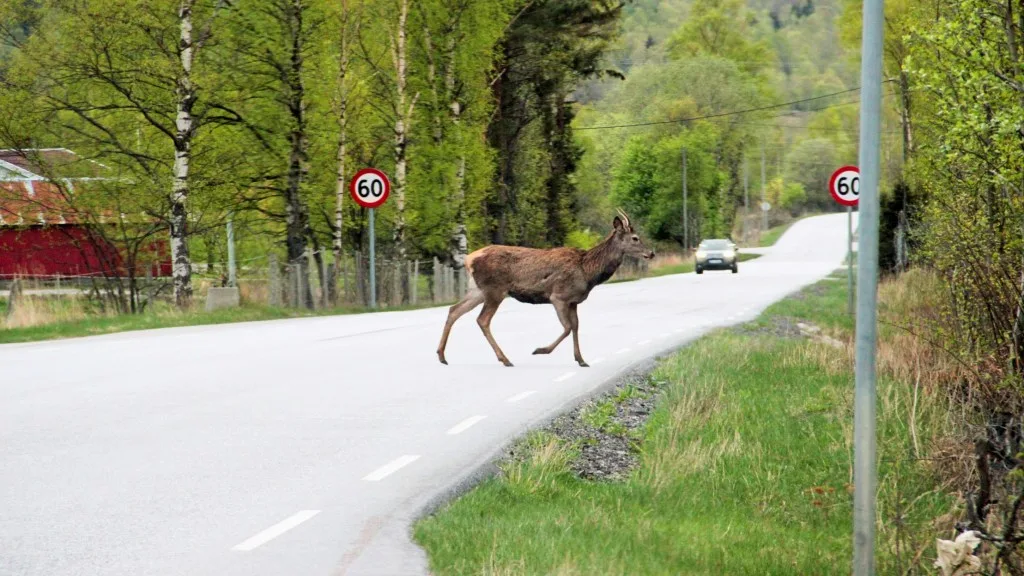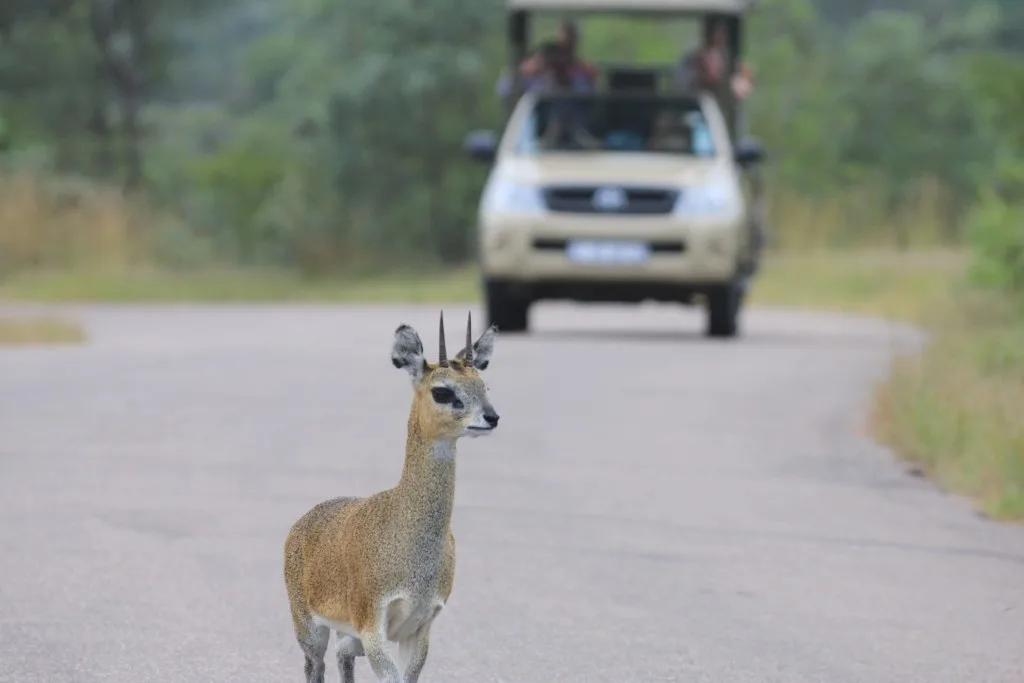You can be the best driver in the world and still hit a deer.
While State Farm says West Virginia and Montana are the states where you’re most likely to have an animal collision, it can happen in practically any state.
Because it can happen anywhere, we want you to know what to do if you hit a deer while driving.
Let’s get started!

Accidents Happen
There are millions of insurance claims each year due to accidents involving hitting animals. According to the Insurance Information Institute, 67% of these accidents involve deer. If it does occur, you’re not the first, and you certainly won’t be the last to hit a deer while driving.
Luckily, most reputable insurance companies will quickly and easily help resolve claims. You may need to get a rental car while your car gets fixed, which the insurance may provide if you have that coverage.
Does Insurance Really Cover Animal Collisions?
As we mentioned above, most insurance policies cover animal collisions. However, it’s important to check with your insurance provider regarding your specific policy. Depending on the circumstances, your accident could be filed under either your comprehensive or collision insurance.
These typically have different deductibles and also could affect your insurance premium.
In addition, if you claim too many incidents your insurance company could decide not to renew your policy. Though that’s rare. Regardless, make sure you have the proper coverage before hitting the road.
We’ll talk more about insurance below.
What To Do If You Hit a Deer With Your Vehicle
You should do certain things if you hit a deer with your vehicle. Failure to follow these steps could cause issues for you down the road. Let’s take a look!
Don’t Panic
When you see a deer in the road, as hard as it might be, most recommend that you don’t swerve to miss it. Doing so can cause you to enter oncoming traffic or send you off the side of the road. These scenarios can cause more damage and be more dangerous than hitting the deer.
While it may not be at the front of your mind, it’s important to be aware of your insurance coverage in these types of situations. Swerving to miss a deer may cause you more issues with your insurance than if you were to hit it.
Most incidents involving animals fall under your optional comprehensive coverage. However, swerving to miss the deer and hitting an inanimate object would be an at-fault collision which would be covered under optional collision coverage.
Typically, comprehensive claims don’t increase your rates. However, paid collision claims often increase your rates.
If you’ve chosen to drive with your state’s minimum coverage, you may not have collision or comprehensive coverage at all. Or, in some cases, your deductible may be higher than the damage to your vehicle.
Ask your insurance agent if you’re unclear what you have. Any good one would be happy to review your policy with you.
Pull Over & Turn On Your Hazards
If you’ve hit deer, pull to the side of the road as soon as you find a safe spot. Turn your hazards on so other drivers can see you. Take a few deep breaths and remain calm.
You should stay in your vehicle.
However, if you must leave your car, you will want to stay far away from oncoming traffic and off the road. You don’t want to escalate the situation by you or your passengers getting into harm’s way.
Call the Police
As soon as you’re able, grab your cell phone and call the police. The local authorities will want to know if the deer is blocking traffic or is a potential hazard for other motorists.
If there are any injuries or property damage, law enforcement will likely have you complete an incident report. Your insurance company may also ask for this report when processing your claim.
Pro Tip: Need some roadside assistance? We uncovered what to expect if you Need Your Car Towed? Expect to Pay More in 2022.

Document the Accident
You should document the accident as much as possible while remaining as safe as possible.
Take pictures and videos of the damage and even the animal if necessary. Get names and contact information for any witnesses. It’s better to have this information and not need it than to wish you had it later.
Don’t Comfort the Deer
You don’t want to go anywhere near the animal. While it can be sad and difficult to hear an animal in pain, these wild animals are incredibly strong. They’re likely to be scared and in pain and will respond erratically.
Their thrashing and aggressive behavior could cause harm to you or any bystanders. It’s best to keep your distance and let law enforcement call the necessary parties to assist the animal.
File an Insurance Claim
You’ll want to start your insurance claim process as soon as possible. If you delay making the phone call to your insurance company, you’re only complicating the process. You don’t want to be stuck with expensive medical and mechanic bills because you delayed filing a claim.
The sooner you can file the claim, the sooner your insurance company can begin processing your claim and get a check to you. If your car isn’t driveable, they’ll also help you navigate getting a tow truck and rental car as soon as possible.
Pro Tip: Hitting a deer isn’t the only way to ruin your adventures! Check out these 5 Ways to Ruin Your Road Trip.

How Not to Hit A Deer in the First Place
It’s best to avoid hitting a deer whenever possible. Here are a few tips so you can stay safe and avoid hitting a deer.
Slow Your Driving
The faster you’re going, the longer it will take you to stop if a deer or other animal were to run into the road. Keeping your speed down will also help you maintain control of your vehicle.
The odds of you skidding off the road and into the ditch or even rolling your vehicle greatly increase the faster you’re going.
You also don’t want to overdrive your headlights. The faster you’re going, the less time you’ll have to see what’s in front of you. So slow down, and you’ll be better able to avoid deer or any other animals on the road.
Watch for Deer Signage
Many highways will indicate areas or segments of roads where deer sightings are common. There will be signage indicating how many miles you should be on the lookout for deer or other animals crossing the highway.
If you see one of these signs, you should reduce your speed and keep your eyes on the road and shoulder looking for any animals.
In addition, you’ll want to pay more attention from October to December. This is their breeding season and when most deer-involved accidents occur.
Assume There Are More Than One
Deer typically travel in groups called herds. So when you see one, it’s best to assume there’s more. You may see one run across the road in front of you and think the road is clear. In reality, there’s a good chance there’s another deer following close behind the initial deer.
Don’t let your guard down, and proceed with caution if you see an animal run in front of you.
Get A Deer Whistle
Some people purchase deer whistles to attach to the front bumper of their car. These pieces of plastic create a high-pitched noise as air travels through them. The purpose of the whistles is to scare away deer and other animals from the roadways.
Pro Tip: You can get a few deer whistles for less than $15. It’s a small price to pay that can save you hundreds or thousands in insurance deductibles and repairs.
Stay Calm and Use Our Tips
Hitting a deer while driving can happen in the blink of an eye. But how you respond once the incident occurs is critical. Follow our tips, and you’ll be able to get back on the road as quickly as possible.
Have you ever hit a deer while driving? Tell us your story!
Discover the Best Free Camping Across the USA
To be honest with you, we hate paying for camping. There are so many free campsites in America (with complete privacy).
You should give it a try!
As a matter of fact, these free campsites are yours. Every time you pay federal taxes, you’re contributing to these lands.
Become a FREE CAMPING INSIDER and join the 100,000 campers that love to score the best site!
We’ll send you the 50 Best Free Campsites in the USA (one per state). Access the list by submitting your email below: